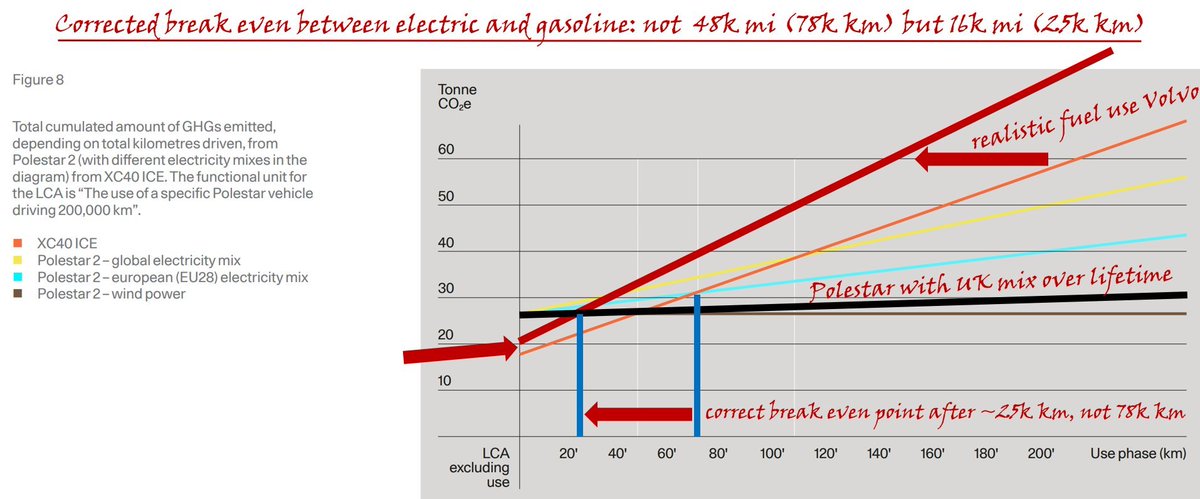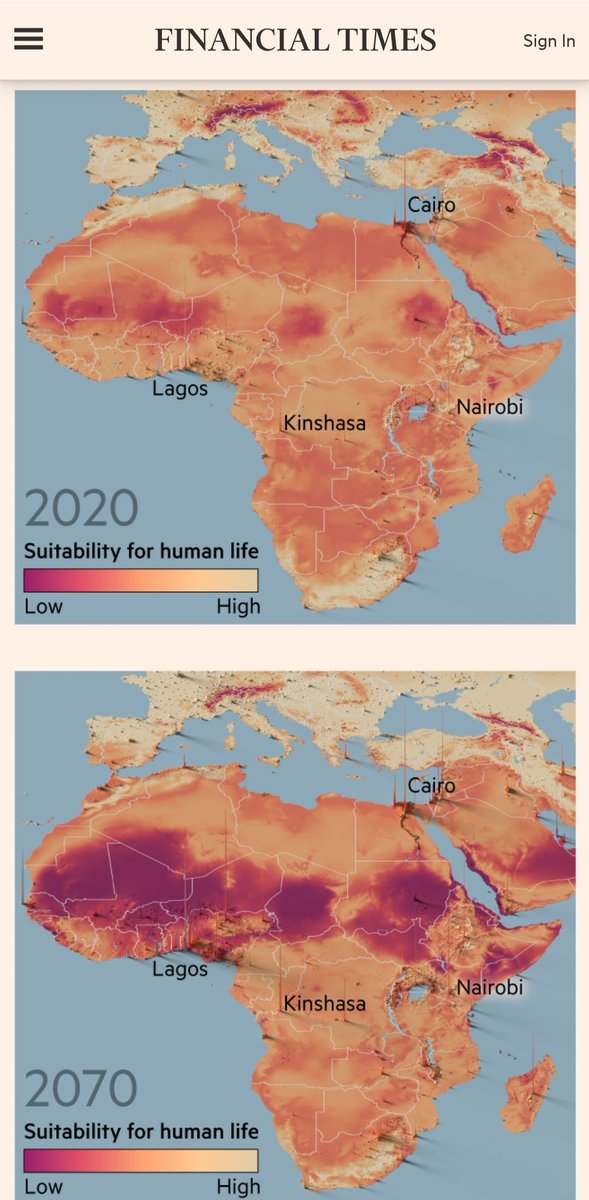
British media and @VolvoCarUK are resuscitating an erroneous study I corrected before in #Astongate.
But it's become WORSE!
Claim: it takes 70k miles for EVs to pay back battery production.
Reality: 16k miles.
Let me explain once again (sigh).
thisismoney.co.uk/money/cars/art…
But it's become WORSE!
Claim: it takes 70k miles for EVs to pay back battery production.
Reality: 16k miles.
Let me explain once again (sigh).
thisismoney.co.uk/money/cars/art…

I research this at the @TUeindhoven and try to correct errors in the media. And this is not my first rodeo with @volvocars and @PolestarCars.
I already flagged this study in september 2020.
I also had a nice 3 hour chat with Polestars LCA lead.
I already flagged this study in september 2020.
I also had a nice 3 hour chat with Polestars LCA lead.
https://twitter.com/AukeHoekstra/status/1306277876354945031
Then the study was reused in an "independent" study that turned out to be published by the wife of a PR head at Aston Martin.
It became the saga of #AstonGate.
Here's a link to my (long) thread that takes you directly to the nice blog by @MLiebreich.
It became the saga of #AstonGate.
Here's a link to my (long) thread that takes you directly to the nice blog by @MLiebreich.
https://twitter.com/AukeHoekstra/status/1333460268249206794?s=20
If you want salacious details and in depth explanations, by all means read the #Astongate thread and/or blog.
But let me resummerize the problems.
They are number 1 to 4 and 6 from my 6 mistakes in my publication in @joule.
I'll tackle them 1 by 1.
cell.com/joule/pdf/S254…
But let me resummerize the problems.
They are number 1 to 4 and 6 from my 6 mistakes in my publication in @joule.
I'll tackle them 1 by 1.
cell.com/joule/pdf/S254…
1) Overestimating battery manufacturing
What you see is that producing the electric C40 emits much more CO2 than producing the combustion version.
Part of this is due to the battery (which at 90 kg/kWh is not very sustainably produced) but much is also due to chassis production!

What you see is that producing the electric C40 emits much more CO2 than producing the combustion version.
Part of this is due to the battery (which at 90 kg/kWh is not very sustainably produced) but much is also due to chassis production!


I don't think this is an electric vs combustion comparison. It's just an indication that the electric version is produced is an inferior factory compared to the combustion one.
Better characterization:
OUR electric C40 production is pretty shitty compared to OUR combustion XC40.
Better characterization:
OUR electric C40 production is pretty shitty compared to OUR combustion XC40.
2) Underestimating battery lifetime
My studies indicate that cars are driven 250k km in Europe and the US and modern batteries outlast that.
Taking 200k km as the lifetime of the battery and car makes the production seem more problematic.
But the impact is small. Let's move on.
My studies indicate that cars are driven 250k km in Europe and the US and modern batteries outlast that.
Taking 200k km as the lifetime of the battery and car makes the production seem more problematic.
But the impact is small. Let's move on.

3) Assuming an unchanged electricity mix over the lifetime of the BEV
This one has a bigger impact: whether you take historical trends or pledges at #COP26, no serious expert I know doubts that the electricity mix becomes cleaner over the coming 15-20 years.
This one has a bigger impact: whether you take historical trends or pledges at #COP26, no serious expert I know doubts that the electricity mix becomes cleaner over the coming 15-20 years.

For the UK I estimated the average energy mix over the lifetime at *100* g/kWh (see #astongate thread for details).
To get the 70k miles number you have to take a current global mix with a whopping 630 g/kWh and even the EU mix they assume (420 g/kWm) is too high.
To get the 70k miles number you have to take a current global mix with a whopping 630 g/kWh and even the EU mix they assume (420 g/kWm) is too high.
So if you buy an electric C40 in the UK the correct number would be to say you will emit (on average and over the lifetime) 19 g/km (31 g/mile).
@volvocars wants you to believe you emit 120 g/km (194 g/mile) or 6 times as much!
That's bollox as @MLiebreich would say.
@volvocars wants you to believe you emit 120 g/km (194 g/mile) or 6 times as much!
That's bollox as @MLiebreich would say.
4) Using unrealistic tests for energy use
@volvocars uses the values from the official EU tests but these are much too low so the use phase is underestimated.
Better to take road tests or EPA values from
fueleconomy.gov/feg/Find.do?ac…

@volvocars uses the values from the official EU tests but these are much too low so the use phase is underestimated.
Better to take road tests or EPA values from
fueleconomy.gov/feg/Find.do?ac…


If I use the EPA values and include the production of gasoline (innovationorigins.com/en/producing-g…).
Then the XC40 emissions are not 212 g/km but 296 g/km!
So in reality the XC40 emits 84 g/km more than @volvocars admits in their study.
So please ppl: start using realistic EPA numbers!
Then the XC40 emissions are not 212 g/km but 296 g/km!
So in reality the XC40 emits 84 g/km more than @volvocars admits in their study.
So please ppl: start using realistic EPA numbers!
If you've been paying close attention you might say: but then you have to take EPA numbers for the EV too! And you would be correct.
If we use EPA numbers the EV use increases from 19 g/km to 27 g/km.
So just 8 g/km more for the EV and 84 g/km for the combustion car.
If we use EPA numbers the EV use increases from 19 g/km to 27 g/km.
So just 8 g/km more for the EV and 84 g/km for the combustion car.
6) Lack of system thinking
A perfectly optimized gasoline XC40 in 2050 might reduce emissions with 30% from 300 to 200 g/km. And that's being optimistic.
An EV produced and driving on low carbon electricity could reduce emissions to close to zero.
That's the endgame!
A perfectly optimized gasoline XC40 in 2050 might reduce emissions with 30% from 300 to 200 g/km. And that's being optimistic.
An EV produced and driving on low carbon electricity could reduce emissions to close to zero.
That's the endgame!

So to summarize: no idea why this study surfaces again claiming it takes 70k miles for an EV to pay back production. But the claim is wrong, building error on error.
If you correct the LCA in the way I've described it becomes 16k miles. Please journalists: start paying attention.
If you correct the LCA in the way I've described it becomes 16k miles. Please journalists: start paying attention.

• • •
Missing some Tweet in this thread? You can try to
force a refresh








